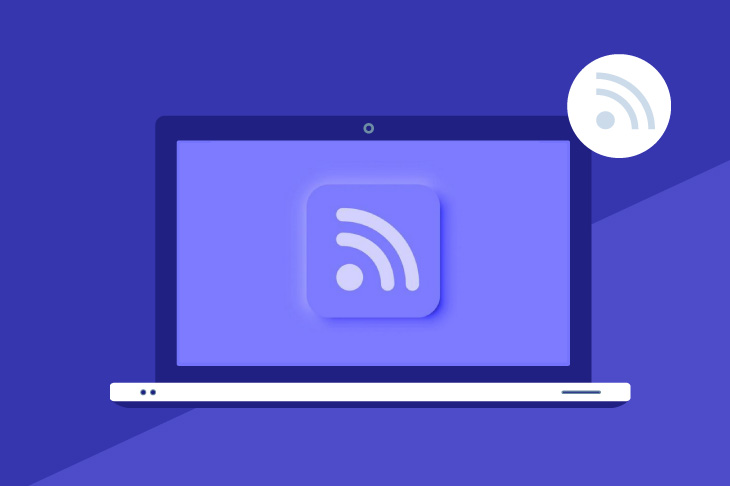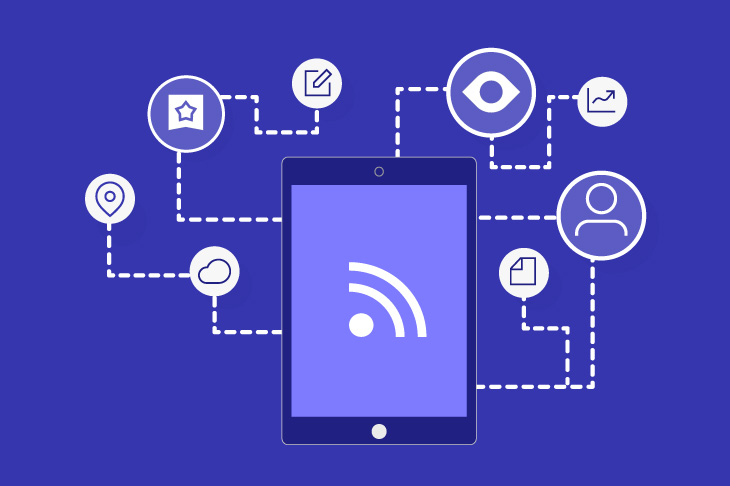
While browsing the internet, an average user visits various pages and applications. A user more often prefers those search engines, websites, blogs, and social media in which new content is constantly uploading. What plenty of people want the most is to be the first informed about the latest posts on each page they follow, which is possible through the RSS feed! But what is RSS?
What is RSS?
The RSS feed is a technology that has affected a lot of modern internet tools. Its primary function is that it integrates on sites (through an RSS reader program) and automatically and directly informs you about the new content of each page. It does not only integrate on one web page but as many as you want. Scanning them all every half hour notifies you about the new posts.
The RSS is an acronym for the phrase: “straightforward syndication” or, according to other sources, for the “rich site summary”. RSS is in the form of text files (in XML). These files get into a feed reader, a type of interface that transforms the RSS text files into news that you read when you are online.
Types of RSS Feed
Even after a basic idea of what an RSS is, it is significant to mention some of its types. The main ones are:
- Feedreader: You can use this particular reader as it is a simple application that offers you easy reading. It has an amazing preview, so you can see its features before you sign up. In case you don’t like something, you can change the configuration.
- Feedly: You can choose this specific feed for businesses and entertainment/information purposes. The homepage displays the latest news on a wide range of topics, and it is an excellent choice for your purposes, as its interface is quite simple.
- Flipboard: If you want your audience to read your news on an RSS feed mobile-friendly and with great design, then Flipboard is the one for you.
- The Old Reader: As you may assume from this RSS feed name, it is quite an easy-to-use feed. Your website readers can easily navigate from any device they may use (desktop, laptop, tablet, mobile).
What are the benefits of RSS?

RSS benefits both the reader and the publisher in different ways. Regardless of your goals for your website, using RSS is an important upgrade…and more and more pages decide to install it.
The main benefits of RSS are:
- Traffic: This is one of its main benefits. Once a post of you attracts your user’s attention, it is likely with a click to use the RSS feed to see more of you in the future. This user becomes a new loyal reader and a potential website visitor.
- Automation: Your audience receives notifications via the reader for any updates on your blog. So, if until now you were sending newsletters to your customers to inform them about new content, you can have another option of updates and start with an RSS.
- Reaching out to a new audience: Anyone visiting a website for the first time hesitates to subscribe to the newsletter to receive notifications. On the contrary, the same visitor could be more willing to use an RSS feed reader, which is more controlled by the user.
- Use of older content: If you have older articles, newsletters, and product reviews, you can use the RSS Feed to reach new audiences.
- Direct linking of your content: By linking to your content, you expose your brand to a wider audience that may bring in leads in the future. Moreover, if you are a local business owner selling products of a well-known brand that uses RSS Feeds, you will also benefit from their use.
How to use RSS?
How do I use the RSS as a professional – or a non-professional?
- Follow all new blogs, podcasts, and YouTube channels
Besides the various websites with news RSS feeds, it is important to have an overall view of what is happening to the other blogs, podcasts, and YouTube channels, getting ideas from the competition. Podcasts are a new trend for businesses and a good idea to show your audience that you are an authority in your niche. - Receive newsletters from preferred accounts and create yours
As mentioned above, you may receive newsletters from accounts without a subscription but using an RSS Feed Reader. You do not have to commit to subscriptions and fill your inbox with emails, while you may receive various newsletters, educate yourself, and get inspired for your brand. - Follow the social media accounts that interest you
It is a fact that in social media, besides the multiple posts, there is massive user activity. The very first moment a post uploads, it has thousands of views. So, by being notified of any new post in time, you gain a substantial advantage over competitors.
At the same time, the algorithm makes things more complicated by displaying certain posts on your home page in delay. An RSS.app will help you create an RSS feed and subscribe to this account on the RSS Reader you use.
In conclusion
In this article, we explained what an RSS is and its main features. RSS feed can help you upgrade your website through your blog, podcast, or YouTube channel. You may have multiple benefits because you can reach new audiences and create reliability. Finally, it is also a great alternative to not having many social media accounts or following only those that interest you.





Join the Discussion